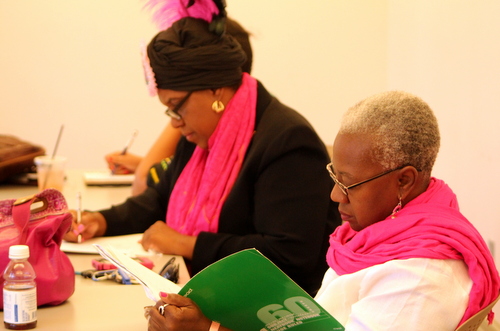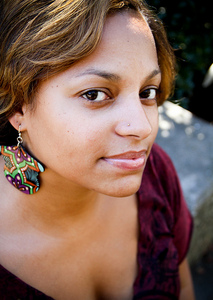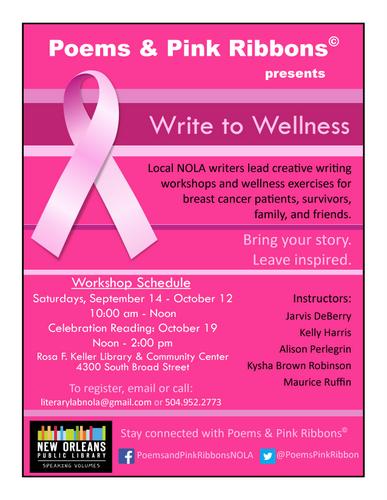
Cherice Harrison-Nelson and Blenda Robertson participate in the Poems and Pink Ribbons workshop. (photo courtesy of Poems and Pink Ribbons)

jewel bush
Sharon Carter Sheridan lost both of her parents to cancer – lung and colon. Barely in her teens, Sheridan’s sister died of uterine cancer at the age of 13 in 1951. Two of her brothers died of cancer – lung and pancreatic. And, she herself has been breast cancer free for 17 years.
But it wasn’t until her sister, her dearest friend and confidant died from the disease that Sheridan became incensed.
“Cancer didn’t make me angry until my older sister was diagnosed with leukemia in 2010. That’s when I got mad,” said the New Orleans woman. “A lot of people around me have died from cancer – friends, cousins, family – but it was just something about my sister getting it that I just didn’t think was fair, and I’ve been angry ever since.”
Sheridan plans to bring her emotions — rage, love, grief and whatever else that bubbles up — to the five-week long, creative-writing workshop, Poems & Pink Ribbons. The third annual series, scheduled to start on September 14 at the Rosa Keller Library, is for breast cancer patients, breast cancer survivors as well as their loved ones.
Last year, Sheridan wrote “Cravings;” in which she describes a hankering for fried chicken during the program. Writing verse about food may come off as trivial or amateurish. Yet, in the crafting of this piece there was a point of self-discovery.
“I mentioned that one of my chemo cravings was McKenzie’s Chicken in a Box because it tasted like mama’s,” Sheridan, 64, said. “I was really … craving my mother, and that really struck a nerve.”
Moments like these are what make Poems & Pink Ribbons a therapeutic literary voyage, a one-of-a-kind support group that encourages honest dialogue on such a sensitive subject while providing participants the safe space to process the range of grief through creative writing and poetry.
“I truly believe we don’t know how we feel until we write it down,” said P&PR founder, poet Kelly Harris.
When Harris’ mother was diagnosed with breast cancer in 2004, she was so distraught that she couldn’t even utter “breast cancer” out loud. Instead, she referred to it as the “Big C.”
“Her calling it the ‘Big C’ made it even bigger for me,” Harris explained.
October is National Breast Cancer Awareness month and to commemorate there’s the merchandising, the fundraising walks, the NFL players wearing pink-accented uniforms, pink spatulas, pink batteries; and, of course, pink ribbons.
But sometimes, despite the heightened awareness, the meaning is drowned in a sea of pink — pink fatigue.
“Underneath all the pink, there’s unresolved emotional issues: How do you resolve that mom is gone? How do you redefine family if mom is gone or how do you see yourself after you’ve had breast reconstruction?” Harris said. “People are really not aware what it feels like to have lost a loved one. You’re not going to get that conversation at a walk or wearing pink socks.”
P&PR is the outlet that allows for deeper discourse around breast cancer – and healing. Participants don’t have to be published authors or experts in writing to enroll in the free program to receive instruction from top-notch local and regional writers like Melissa Dickey, Gina Ferrara, Maurice Ruffin, Alison Pelegrin and Jarvis DeBerry, Harris’ husband, who lost his mother to breast cancer in 2011.
Harris served as the primary caregiver for her mother who was diagnosed at Stage 3. Her mother’s care became priority No. 1. Then in her 20s and living in her native, Ohio, Harris postponed graduate school and got a full-time job. Her life became nonstop doctor’s appointments, emergency room visits and trips to the pharmacy. Near-always at her mother’s bedside, Harris allowed herself one act of literary self-preservation during this period: a week at the writer’s retreat, Cave Canem. It was there she met DeBerry in 2005.
“I felt guilty being gone the whole time. I was a grouch. Everyone seemed so intellectually poetic, and I felt it was a mistake me being there,” Harris said. “So when it was time for me to introduce myself, I said, ‘My name is Kelly. My mom has breast cancer, and I don’t know why I’m here.’”
After, Harris’ ornery, yet endearing introduction, DeBerry walked up to her and said, “It takes a lot of courage to want to be a poet.”
There is a similar sentiment behind P&PR, bringing survivors, patients and family members together to audaciously write through the hurt.
Last year, a woman in the session had one breast and struggled with body image issues. One was quiet, but did the work. It wasn’t until the end of the course, at the public reading, she summoned the courage to share her creative work in front of an audience. At 67, it was her first time reading a poem aloud. Another participant lost her daughter to violence while undergoing treatment.
Jo Thompson, a 12-year breast cancer survivor, said the expertise of each of the artists was amazing, “They all had a unique approach in sharing their gifts with us and supporting us to feel empowered in sharing our written words. I have never considered myself a poet nor had I ever thought my writings/journaling/poems were ever anything more than just fun for me.”
Breast cancer is the most common cancer in women worldwide. It is estimated that 234,580 people will be diagnosed with breast cancer in the United State during 2013, according to National Cancer Institute. A little more than 40,000 people will die from the disease this year.
A woman’s risk of breast cancer basically doubles if she has a first-degree relative –mother, sister, daughter — who has been diagnosed. Breast cancer is rare in men, but not all together impossible. In 2013, it is estimated. there will be 2,240 new cases of invasive breast cancer in men and 410 breast cancer deaths in the nation.
Breast cancer is a costly illness bearing a financial strain due to frequent hospital stays, expensive drug prescriptions, procedures, co-pays and out-of-pocket costs that quickly add up. Approximately 386,000 women, more than 27.4% of women in Louisiana, are uninsured, according to figures from the National Women’s Law Center. The numbers are higher for women of color. In Louisiana, 34.8% of Black women and 54.8% of Hispanic women are uninsured compared to 22.8% of White women.
Louisiana is on the list of 21 total states in the U.S. that refused to expand Medicaid eligibility through the Patient Protection and Affordable Care Act dubbed Obamacare for short – and to be insulting. This means that more than 5 million low-income, struggling folks across the country will not have their health care needs met, a large percentage women. The need for women, forward-thinking women, who will truly represent the best interests of all women regardless of class, educational background and socio-economic status, to serve in elected positions on all levels of government is tremendous.
“We need more women in the legislature. These men have no clue. You would think they do because they have wives, mothers and daughters, but it has got to come from the female perspective,” said Sheridan, a longtime American Cancer Society volunteer.
“If women don’t feel comfortable running for office, it is incumbent upon us to be advocates for women’s issues. If it weren’t for the women in our State Legislature, Sen. Karen Carter Peterson and Rep. Helena Moreno, we might have lost breast and cervical cancer funding.”
P&PR is a form of emotional, spiritual advocacy, which manages grief while celebrating the triumph of the human condition. Laughter is mixed in with the tears. Some are for joy. Some are to mourn. All are a release.
Harris’ mother survived breast cancer, but her mother-in-law didn’t, both of which motivated Harris to launch P&PR, a labor of love and healing.
“Sometimes we grieve alone or in silence. P&PR comes out of pain. It comes out of knowing women who have died of breast cancer. They didn’t have the opportunity to participate in something like this,” said Harris, who holds a MFA in poetry with a concentration in art therapy from Lesley University in Cambridge, Mass.
“What we do is a small dent in the work that needs to be done around breast cancer. I’m not a physician, but I believe in the power of words and that they can heal.”
The workshop, funded in part by a grant by the Poets & Writers Inc., meets every Saturday from September 14 through October 19. To register or for questions, contact literarylabnola@gmail.com or (504) 952-2773.
jewel bush, a New Orleans native, is a writer whose work has appeared in The (Houma) Courier, The Washington Post, The Times-Picayune, New Orleans Homes & Lifestyles Magazine, and El Tiempo, a bilingual Spanish newspaper. In 2010, she founded MelaNated Writers Collective, a multi-genre group for writers of color in New Orleans dedicated to cultivating the literary, artistic and professional growth of emerging writers. She is currently communications coordinator for Service Employees International Union Local 21LA. Her three favorite books are Their Eyes Were Watching God, The Catcher in the Rye, and Are You There God? It’s Me, Margaret.

So many brave women! I wonder if Sheridan has looked into either genetic or environmental causes for all the cancer in her family. Good luck to all of these survivors.